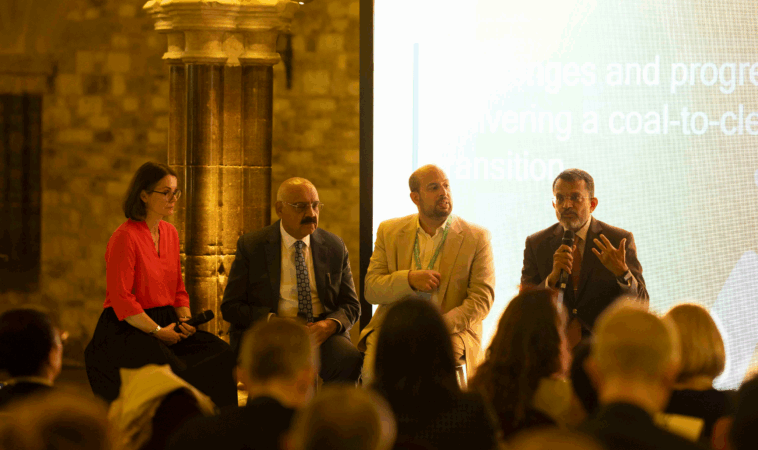
PPCA expands into Western Balkans and Poland

UK and Canadian Ministers welcomed twelve new members and partners to the Powering Past Coal Alliance (PPCA) today at the London Climate Action Week [1]. They will work together with the Alliance to ensure that the UN Climate Summit COP26 in Glasgow in November this year is the moment countries commit to the action needed to end coal power generation.
The new PPCA members and partners are:
- European governments: Spain, Croatia, Montenegro, North Macedonia, and Albania,
- Polish region Eastern Wielkopolska and utility ZE PAK;
- Businesses and financial institutions: French asset manager Amundi; European Sustainable Investment Forum; Canadian utility Capital Power, engineering consultancy Mott MacDonald, and World Business Council for Sustainable Development (WBCSD).
Canada’s Environment and Climate Change Minister, and co-chair of the PPCA, Jonathan Wilkinson, said:
“Phasing out coal from the electricity sector is the single most important step we must take to tackle climate change. I am pleased to welcome these new members and partners from governments, the private sector, and financial institutions to the Alliance at this critical time ahead of the COP26 United Nations Climate Change Conference later this year. Together we can ensure a strong economic recovery from the COVID-19 pandemic and create a healthier planet for future generations.”
UK Government has also confirmed today that the country’s coal phase-out date will be brought forward from 2025 to 2024, setting a powerful example for others to follow ahead of COP26.
UK Energy and Climate Change Minister, and co-chair of the PPCA, Anne-Marie Trevelyan, said:
“As PPCA co-chair, it is an absolute pleasure to welcome both governments and businesses across the world to the alliance today, including Spain, North Macedonia, Montenegro, Croatia, Albania, Eastern Wielkopolska, and ZEPAK. With the UK officially announcing today the end of coal power by October 2024, I look forward to working together with all the PPCA members, helping each other take ambitious strides towards our collective goal of global coal power phase-out.”
In a video message to the PPCA event announcing new members, COP26 President-Designate Alok Sharma said:
“Ahead of COP26 in November, the UK COP Presidency is urging all countries to commit to phasing out coal power. Setting an end date for coal supports a just transition, because if you know where you are going, you can plan how to get there. I urge all countries and businesses to set coal phase out dates and join the Powering Past Coal Alliance, because by working together we can consign coal power to history where it belongs.”
Spain is on track to become coal-free in record time, closing 85% of its total coal capacity in just four years, from 2018 to 2022. In 2019 and 2020, the country closed all its coal mines and more than half of its installed coal capacity. With its exemplary just transition plans for affected coal workers and communities, Spain is a role model for countries across the world seeking to accelerate coal phase-out in a fair way, and through the PPCA, it will share its best practises ahead of COP26.
In a video message to the PPCA event announcing new members, Spain’s Deputy Prime Minister and Minister for the Ecological Transition Teresa Ribera, said:
“We need to take concrete steps towards a global coal power phase-out at COP26 in Glasgow. Spain is fully committed to this goal. In the last three years, we have closed a great share of our own coal capacity. We have also adopted a pioneering just transition strategy to phase out coal as soon as possible, but at the same time to invest in the economic recovery in the areas where coal plants were closed. We are convinced that this transition can be a catalyst for new opportunities, but we need to pay attention to the impacts that may come along when we make it real.”
North Macedonia and Montenegro, which get around half of their power from burning lignite, have ambitious plans to phase it out by 2027 and 2035, respectively. Croatia has committed to working together with the Alliance to set a coal phase-out date in the near future. Albania has one of the highest shares of renewables in the region. The Polish Eastern Wielkopolska subregion, which hosts two coal-fired power stations and about 4,000 coal sector workers, and the energy company ZE PAK, which owns the region’s coal infrastructure, have committed to exit coal by 2030. As the first PPCA members in Western Balkans and Poland, where electricity production is currently dominated by coal, they will play a key role in facilitating a faster energy transition in these countries and regions.
With today’s additions, PPCA members now include 25 European governments [2] with 134GW of coal capacity either retired since 2010 or scheduled to retire before 2030. As PPCA members show, Europe is increasingly aligning with the 2030 deadline for coal phase-out in advanced economies which is required to reach net zero emissions by 2050 [3]. This shift will further accelerate thanks to the EU’s new 2030 climate target and the ‘Fit for 55’ package, boosting the bloc’s growing role in accelerating coal phase-out globally in the lead up to COP26.
The number of businesses and financial institutions signing up to or partnering with the PPCA to support the transition away from coal is also growing fast. One of the world’s top asset managers Amundi (€1.755 trillion in assets under management), has an ambitious policy to exclude companies developing new coal capacities and actively engage with others on Paris-aligned coal exit strategies. Canadian utility Capital Power is helping the Canadian province of Alberta ‘power past’ coal six years ahead of schedule and is working across North America to create a low-carbon energy sector. Global engineering, management, and development consultancy Mott MacDonald is working with governments and businesses to develop projects facilitating energy transition across areas such as offshore wind, the creation of low carbon hydrogen hubs, and the transition of electricity grids to low and zero carbon.
The Alliance is also welcoming two new influential partners. The World Business Council for Sustainable Development (WBCSD) is the leading voice of business for sustainability as a global, CEO-led organization of over 200 businesses. The Alliance is also joined by the European Sustainable Investment Forum (Eurosif), the leading European association for the promotion and advancement of sustainable and responsible investment across Europe.
This diverse range of finance and business groups joining the Alliance today demonstrates that the private sector increasingly considers Paris-aligned coal phase-out commitments to be an essential and concrete first step toward meeting net-zero pledges. This sends a critical signal to governments to step up their ambition on coal phase-out for COP26.
Michael R. Bloomberg, U.N. Secretary-General’s Special Envoy for Climate Ambition and Solutions, Founder of Bloomberg LP and Bloomberg Philanthropies, and 108th Mayor of New York City, said:
“Coal is a major threat to the climate and our health, but we’ve taken important strides to move beyond it in Europe and across the world – and the Powering Past Coal Alliance is helping to lead the way. Bloomberg Philanthropies has been a strong supporter of the PPCA since the beginning, and we’re glad to welcome today’s new members. PPCA’s continued growth is a sign of momentum in our efforts to transition from coal to clean energy, and I look forward to making even more progress together.”
Mladen Bojanic, Minister of Capital Investments of Montenegro, said:
“The coal power plant and mine have been the backbone of Montenegro’s energy system and the source of socio-economic status of the entire northern part of the country. Our biggest challenge now is how to properly implement the green energy transition, while ensuring support for affected workers and communities. Montenegro has committed to ending coal power generation by 2035. But with the assistance of our foreign partners, in financial and institutional terms, we will be able to move away from coal even faster.”
Naser Nuredini, Minister of Environment of North Macedonia, said:
“North Macedonia has submitted an enhanced NDC to the Paris Agreement earlier this year, committing to 51% emission cuts by 2030 compared to 1990 levels. This is an ambitious target for a country whose electricity production is heavily relying on coal. In moving away from it, our key challenge is the just transition one. By joining this Alliance, we believe we can cooperate and help each other achieve a smoother and faster transition to cleaner energy sources. This is urgently needed to reach the global climate targets.”
Maciej Sytek, President of the Board of Agencja Rozwoju Regionalnego in Konin and the Representative of the Board of the Wielkopolska Region for Restructuring of Eastern Wielkopolska, said:
“A rapid exit from coal will be a real revolution for our region, but also an opportunity to improve people’s quality of life. Through our membership in the Powering Past Coal Alliance, we will share experience and work together with national and local governments and companies from around the world to make the best use of the subregion’s development potential brought about by the energy transition.”
Piotr Korytkowski, Mayor of Konin, Eastern Wielkopolska’s main city, said:
“The need to protect the environment means that coal is becoming a fuel of the past. We need a new, modern development pathway based on electromobility and renewable energy, while creating jobs for those who will lose them as a result of the gradual closure of coal mines and power plants. Membership in the Powering Past Coal Alliance is another step that will help us safely guide our subregion through the upcoming transformation and strengthen our influence on the measures adopted by the national government.”
President of ZE PAK SA Capital Group, Piotr Woźny said:
“We take the decision to shift from coal to renewables within a decade very seriously. Together with trade unions, we are putting a lot of effort into reskilling workers and repurposing post-mining areas. For these priorities, we are seeking support from EU funds, the Just Transition Fund in particular. Our transformation can be a model for other coal regions and companies across the world. We will be happy to share our best practices at the upcoming climate summit COP26 in Glasgow.”
Caroline Le Meaux, Head of ESG Research, Engagement, and Voting policy at Amundi, said:
“Climate change represents a systemic risk for our economies and societies. The transition to decarbonized economies is part of a collective journey for governments, companies and investors. Phasing out coal is paramount to achieve this goal and we are convinced that the financial sector has a key role to play in supporting this transition. Joining the PPCA today is part of our broader engagement to support climate action, as a global responsible asset manager”.
Brian Vaasjo, President and CEO of Capital Power, said:
“Capital Power will be net carbon neutral by 2050. As we work to transform our energy system to support a low-carbon future, we’re repowering our Genesee Generating Station in Alberta to natural gas, ending coal-fired generation in 2023 and ensuring a long-term future for our facilities as a hub of innovation and for the commercial application of new decarbonization technologies. We also continue to grow our renewable generation portfolio. The PPCA is an excellent forum for collaboration across stakeholders to deliver a clean energy future together for generations to come.”
Denise Bower, Mott MacDonald executive director, said:
“Joining the PPCA fits very well with our own climate goals: to help our business and our clients achieve net zero. Our company is already at the forefront of this global challenge, and we are pivoting towards supporting the creation of low carbon and zero carbon infrastructure, as well as improving the environmental performance of existing infrastructure.”
Claire O’Neill, Managing Director of Climate & Energy at the Worldwide Business Council for Sustainable Development (WBCSD), said:
“We are delighted that the WBCSD is joining the PPCA as its corporate partner. The work of the PPCA has never been more vital. Phasing out coal-fired electricity is one of the most important steps we can take to tackle the climate crisis. Business has an enormous role to play in driving action along global supply chains and providing upward pressure to accelerate their phase out plans. With more than 200 members representing leading sustainable companies from all sectors and major economies, and a combined revenue of $8.5 trillion and 19 million employees, the WBCSD is calling on business to join the PPCA and make coal history.”
ENDS
For more information, please contact:
Anna Drazkiewicz, Communications Manager, Powering Past Coal Alliance Secretariat, anna.drazkiewicz@poweringpastcoal.org, 00 32 487 324 562
Notes:
[1] The announcement took place at “PPCA Europe Roundtable: Revitalising Energy Communities and Opportunities for Economic Growth”, on June 30, 2021, organized with support from Bloomberg Philanthropies, more information and registration here. [2] The Powering Past Coal Alliance was formed by Canada and the UK in 2017 to bring together national and subnational governments and the private sector to accelerate the phase-out of unabated coal power. Since then, the Alliance has grown to 135 members who are at the forefront of accelerating real-world action on coal power phase-out.The PPCA includes 19 EU governments (Austria, Belgium, Croatia, Denmark, Finland, France, Germany, Greece, Hungary, Ireland, Italy, Latvia, Lithuania, Luxembourg, Netherlands, Portugal, Slovakia, Spain, Sweden) and 6 non-EU European governments (Albania, Liechtenstein, Montenegro, North Macedonia, Switzerland, United Kingdom).
Half of Europe’s coal plants closed or scheduled to close before 2030, amid rising carbon prices and the expansion of renewables. Analysis shows that by 2025, all coal plants in the EU will be uncompetitive compared with renewables and storage.
[3] To get to net zero emissions by 2050, countries need to stop construction of any new coal power plants immediately, phase them out completely by 2040 globally, and by 2030 in OECD countries.




